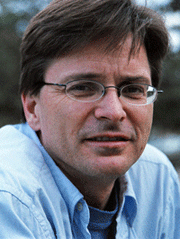Added to the problem of soil loss, the industrialization of agriculture has given us pollution by toxic chemicals, now universally present in our farmlands and streams. We have less soil, and it is more degraded. We’ve masked that for years through the use of petrochemicals -- pesticides, herbicides, fertilizers. But that “solution” is no solution, and is in fact part of the problem. There are no technological substitutes for healthy soil and no miraculous technological fixes for the problem of agriculture. We need to move past the industrial model and adopt an ecological model.
RJ: This concern about chemicals has led to increased support for organic agriculture. Is that the solution?
WJ: Organic agriculture is a start but by itself is insufficient. Eliminating the chemicals is only half the problem -- we still have to deal with soil erosion. Remember that we humans had organic agriculture until very recently, when we got industrial agriculture, and we still lost soil all along the way, for the last 10,000 years. There is good reason to believe we started the increase of carbon dioxide into the atmosphere about then (with the carbon compound of the soil being oxidized). It has only become a crisis in our time due to the scale increase of people and material and energy throughput.
RJ: OK, so organic alone isn’t the answer. Isn’t that where no-till or minimum-till farming comes in?
WJ: Those methods help deal with erosion, but as practiced today they require unacceptable levels of chemical inputs and end up eliminating biodiversity. Once again, it doesn’t offer a way out of the extractive economy and the problem of contamination.
RJ: So, where does that leave us?
WJ: Let’s go back to basics: The core of this idea is the marriage of agriculture and ecology. As Wendell says, we need to take nature as the measure. We need to look to nature for models of how to manage ecosystems in a sustainable fashion. At The Land Institute, we think that leads to perennial polycultures. Instead of annual crops grown in monocultures on an industrial model, we are looking at perennials in mixtures, which we think can solve a number of problems regarding erosion and contamination.
RJ: Before I ask about the details, a basic question: Is that feasible, given the 6.5 billion people on the planet? Can such strategies focused on perennials produce enough food?
(Note: You can view every article as one long page if you sign up as an Advocate Member, or higher).





